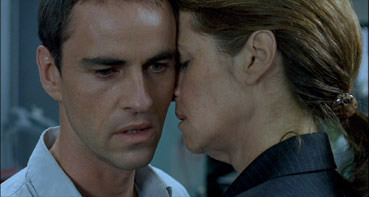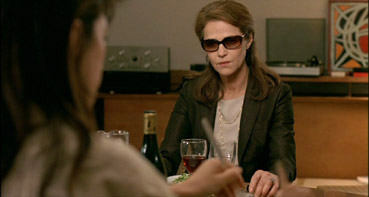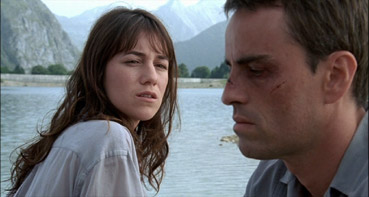|
Metaphors.
Don't you just love 'em? Those moments
in films that play one way on the surface but are suggestive of so much more, like
that trip beneath the lawn into the dark, disturbing world
of insects that kicked off Blue
Velvet, that deadly spike in Marylin Chambers'
armpit in Rabid,
and any number of elements in the cinema of Tsukamoto Shinya. But if you are going to pull this off, it's
best not to make your metaphors too obvious or too literal,
and whatever you do, don't have a character stand there and
explain it for us.
Lemming is certainly the sort of non-specific title that gets my
attention. Given that it's not a nature film, a Disney
animation or aimed in any way at kids, we can anticipate that there will be a degree
of metaphor from the start, and when nice, middle-class
engineer Alain decides to sort out an blocked sink and
finds a lemming jammed in the pipe, we get it. Lemmings, as most will
know, are primarily famous for leaping off cliffs in a sort
of inexplicable mass suicide, something we now know to be
bunkum, which is very clearly explained here to Alain's
wife Bénédicte by an expert in these matters.
The Lemming is obviously dead. But wait, it's still breathing
after all, and with a bit of specialist attention is able
to recover. A short while later
a character who feels trapped and constricted by their life
(like a lemming squashed in a waste pipe, perhaps?) commits
suicide (as lemmings are fabled to do), but their spirit
appears to live on in another (revived from the dead, just
like that lemming). Ah, I get it.

Lemming is a curious but intriguing creation, part thriller, part
social drama, and part ghost story, at least if you choose to read it that
way. After establishing lead character Alain as an inventor
of improbable objects – a mobile webcam that flies around
the house like a remote control helicopter, which is primarily introduced so that he can use it later to spy on his
boss Richard – the real plot kicks off when Richard invites
himself and his wife Alice round to dinner. They arrive
late and the dinner does not go well, as Alice is openly
rude to her hosts and bitterly reveals details of her husband's
whoremongering. A few evenings later she goes looking for
her husband at work and instead finds Alain working late
and very directly attempts to seduce him. Tempted though
he may be, he turns her down. A couple of days later she drops
in on Bénédicte, asks her to lie down for a while,
and...
Just
how much of the plot to reveal is a tricky call here, as
surprising narrative turns are certainly one of the film's
strong points, if only because you'd have to be a surrealist
on mescaline to see a couple of them coming. Not quite as
successful is the cross-genre wandering, which comes across
less as a deliberate attempt to wrong-foot the audience
than an uncertainty about just what the film really wants to be, which
can prove occasionally frustrating and leave it feeling
a little unfocussed.
But
despite this, Lemming remains oddly involving, thanks in
part to the unhurried pacing, the vivid sense of place
and the sometimes dream-like manner in which the plot unfolds.
But what ultimately sells it are a quartet of finely judged performances, the best of which comes from Charlotte
Rampling, whose icy hostility and predatory sexuality as
Alice is almost worth the ticket price alone.

Lemming certainly wanders into interesting territory. The relationship
between Richard and Alice, one devoid of love, trust and
positive physical contact, is the flipside of the contented
stability that exists between Alain and Bénédicte.
Exposure to them proves infectiously destructive, launching Alain on a downward spiral (amusingly
represented by his increasingly visible signs of injury)
that leads only to chaos. But
too often the film flirts with ideas and plot twists that I couldn't
help wishing it would grab with both hands, resulting in
a work that is pleasingly odd, but perhaps not quite odd
enough, if you get my drift. Lacking the clarity of vision
and emotional terror of David Lynch or Michael Haneke, whose
work the film has been sometimes compared to, and even
the grind-in-the-seat discomfort of director Dominik Moll's
previous Harry, He's Here to Help, it's
still very much worth a look, though more for its feel and
its characters than its not fully realised plot.
Framed
1.85:1 and anamorphically enhanced, this is a very nice
transfer all round, with colour, contrast and detail all
of a very high order. Black levels are bang-on and shadow
detail very good. Daylight exteriors look particularly impressive.
The
5.1 soundtrack is a subtle but crystal clear and very effective
mix, really adding to the atmosphere of individual scenes,
whether it be wind in trees, heavy rainfall or, best of
all, the strange noises emanating from the kitchen one night,
a sequence that as a result is genuinely suspenseful.
In
the Interview with Dominik Moll (25:51), the director talks about how the narrative of the
film took shape, the casting, the characters, the purpose
of specific scene, the importance of good sound design,
working with dead lemmings, and his pleasure on hearing
that the film is being discussed, even by those who did
not like it. The interview is in English, in which Dominik
is fluent, and either conducted at the Artificial Eye offices
or set dressed by them – there are an awful lot of
their DVDs in the bookcase behind the director.

There
are 6 featurettes, comprised largely
of interviews and behind-the-scenes footage: Knocks
(2:57) looks at the character of Alain; A Picture
(2:30) examines the process of preparing a still photograph
used as a prop in the film; On the Rock
(6:06) details the blocking of a key scene by a lake; Substitution
(4:16) covers a scene that occurs later in the film that
is best not revealed here; Little
Beasts (10:09) is all about the lemmings,
real and CGI (this is really interesting); and Dominik
with a k focuses on the director and his working
methods.
There
are trailers for both Lemming
(1:52) and Harry He's Here to Help (1:48).
The Lemming trailer reveals a little more
than ideal if you've not yet seen the film.
Finally
we have filmographies for Laurent
Lucas, Charlotte Gainsbough, Dominik Moll, Andre Dussollier
and Charlotte Rampling.
Lemming
is a film I enjoyed but was never particularly wowed by,
a cross-genre tale told with commendable subtlety, but without
that certain something needed to really get under your skin.
Damned fine performances all round, though.
The
film looks very good on Artificial Eye's DVD, with first-rate picture and sound and some interesting extra features.
If you have a taste for the unusual, but don't like your
thrillers too dark or your twists too
strange, then this may be up your street.
|